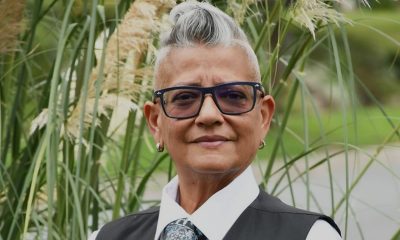Arts & Entertainment
Gay couple takes stage at Renaissance Festival
Marylanders relive 1544 England each weekend

The year is 1544. The location is Revel Grove, a small village in the county of Oxfordshire, England. The Royal Court of King Henry VIII is paying a visit to this village as part of its annual summer progress. Attending on His Majesty is the Archbishop of Canterbury, Thomas Cranmer, and his partner, the diplomat Sir Ralph Sadler.
Wait a minute! If you don’t remember reading that in a history book, perhaps some clarification is needed. Revel Grove is a fictitious name given to the site at The Maryland Renaissance Festival. And while no history book mentioned a relationship between the Archbishop and Sir Ralph, the actors who portray those characters have been together for 17 years.
Steven Edward Kirkpatrick (Archbishop Cranmer), and Charles Boyington (Sir Ralph), currently live in Hyattsville but make the drive to 16th century England each weekend as part of the acting company of the Maryland Renaissance Festival.
Not surprisingly, theater is what drew the couple together. They met in Memphis, Tenn., while working at the Playhouse on the Square. Charles was directing the play, “Marvin’s Room,” and Steven was supposed to audition but someone had told him there was no role for him in the play.
“It worked out for the best since I would not have been open to dating him if I was also directing him at the time,” says Charles.
“Looking at pictures of those years, we look like mere kids,” muses Steven. “The amazing thing is that it doesn’t seem like that long.”
Both have been performing for more than 20 years but do not often act together.
“More often than not we do our own thing,” says Charles. “We were in a production of Jekyll and Hyde, which was written for us. I was Jekyll and Steven was Hyde.”
“We haven’t performed together in several years,” notes Steven, “so the festival has been fun. Once we did play the same role in the same show. There was a period back in Memphis when Charles somehow ended up being my unofficial understudy for several roles. He took over for me as Sebastian in The Tempest when I had to step in as Prospero. It’s amusing to see photos of us playing the same role and wearing the same costume, but I will say he always played the character very differently from me.”
While both feel a major benefit for a couple performing in the same show is the ability to carpool, is there ever a strain to being in the same production?
“Theater has always been a primary bond between us, so it is far more positive than a negative. If we don’t get a chance to perform regularly we both suffer, so this way we’re both getting an important need met,” says Steven.
“Most of the time it is great fun,” says Charles. “The only issue is I like to arrive early to rehearsals and performances and then stay later than necessary to hang out. Steven wants to arrive later and leave earlier. This is true in just about everything we do though.”
Actors can be sensitive regarding their work. Shelley Winters claimed her husband, Vittorio Gassman, once gave her a black eye when she confessed she preferred Olivier’s Hamlet to his. As a couple, do they ever critique each other’s work?
“As the years have gone by, we have learned how to critique each other without tripping on toes,” laughs Steven.
Steven first performed at the Festival in 2002, and Charles in 2008. Steven was on a hiatus for a few seasons, so this is the first year they have performed together at the venue. As a gay couple, they have they found the Renaissance Festival a positive performing environment.
“It can appear different on the surface since there is an emphasis on machismo by some of the guys in the cast,” says Charles. “But most of that is just trying to play up the time period. Once you get to know these folks, they are perhaps the most accepting people on the face of the earth. They come from all walks of life and have a ‘live and let live’ philosophy.”
Stephen agrees, “Because so many actors love this venue and are given a chance to return, there is definitely a sense of this being like a second family. I’ve always felt that I can truly be me in all of my many aspects and have complete acceptance in this venue. And I don’t always feel that way in certain sectors of the gay community! The cast and vendors are wonderful, so it’s been great.”
Steven and Charles will be performing at The Maryland Renaissance Festival weekends through Oct. 23.
Sports
Bisexual former umpire sues Major League Baseball for sexual harassment
Brandon Cooper claims female colleague sexually harassed him

A fired former umpire is suing Major League Baseball, claiming he was sexually harassed by a female umpire and discriminated against because of his gender and his sexual orientation.
Brandon Cooper worked in the minor league Arizona Complex League last year, and according to the lawsuit he filed Wednesday in federal court in Manhattan, he identifies as bisexual.
“I wanted my umpiring and ability to speak for itself and not to be labeled as ‘Brandon Cooper the bisexual umpire,’” he told Outsports. “I didn’t want to be labeled as something. It has been a passion of mine to simply make it to the Major Leagues.”
But that didn’t happen. Instead of being promoted, he was fired. His suit names MLB and an affiliated entity, PDL Blue, Inc., and alleges he had endured a hostile work environment and wrongful termination and/or retaliation because of gender and sexual orientation under New York State and New York City law.
“Historically the MLB has had a homogenous roster of umpires working in both the minor and major leagues,” Cooper claims in his suit. “Specifically, to date there has never been a woman who has worked in a (regular) season game played in the majors, and most umpires are still Caucasian men. To try to fix its gender and racial diversity issue, defendants have implemented an illegal diversity quota requiring that women be promoted regardless of merit.”
Cooper claims former umpire Ed Rapuano, now an umpire evaluator, and Darren Spagnardi, an umpire development supervisor, told him in January 2023 that MLB had a hiring quota, requiring that at least two women be among 10 new hires.
According to the suit, Cooper was assigned to spring training last year and was notified by the senior manager of umpire administration, Dusty Dellinger, that even though he received a high rating in June from former big league umpire Jim Reynolds, now an umpire supervisor, that women and minority candidates had to be hired first.
Cooper claims that upon learning Cooper was bisexual, fellow umpire Gina Quartararo insulted him and fellow umpire Kevin Bruno by using homophobic slurs and crude remarks. At that time, Quartararo and Cooper worked on the same umpiring crew and being evaluated for possible promotion to the big leagues.
This season, Quartararo is working as an umpire in the Florida State League, one of nine women who are working as minor league umpires.
Cooper said he notified Dellinger, but instead of taking action against Quartararo, he said MLB ordered Cooper to undergo sensitivity training. According to his lawsuit, he was also accused of violating the minor league anti-discrimination and harassment policy.
Cooper’s suit says he met with MLB Senior Vice President of Diversity, Equity and Inclusion Billy Bean — who the Los Angeles Blade reported in December is battling cancer.
The lawsuit says at that meeting, Bean told the umpire that Quartararo claimed she was the victim, as the only female umpire in the ACL. Cooper said he told Bean Quartararo regularly used homophobic slurs and at one point physically shoved him. He also claims that he has video evidence, texts and emails to prove his claim.
But he said his complaints to Major League Baseball officials were ignored. His lawsuit said MLB passed him over for the playoffs and fired him in October. He said of the 26 umpires hired with Cooper, he was the only one let go.
Through a spokesperson, MLB declined to comment on pending litigation. Quartararo has also not publicly commented on the lawsuit.
a&e features
Eastern Shore chef named James Beard Finalist
Harley Peet creates inventive food in an inclusive space

In a small Eastern Shore town filled with boutiques, galleries, and the occasional cry of waterfowl from the Chesapeake, Chef Harley Peet is most at home. In his Viennese-inflected, Maryland-sourced fine-dining destination Bas Rouge, Peet draws from his Northern Michigan upbringing, Culinary Institute of America education, and identity as a gay man, for inspiration.
And recently, Peet was named a James Beard Finalist for Best Chef: Mid-Atlantic – the first “Best Chef: Mid-Atlantic” finalist representing the Eastern Shore.
Peet, after graduation from the Culinary Institute of America, took a position as sous chef at Tilghman Island Inn, not far from Bas Rouge. Falling in love with the Eastern Shore, he continued his passion for racing sailboats, boating, gardening, and fishing, and living his somewhat pastoral life as he opened Bas Rouge in 2016 as head chef, a restaurant part of the Bluepoint Hospitality group, which runs more than a dozen concepts in and around Easton, Md.
Coming from a rural area and being gay, Peet knew he had his work cut out for him. He was always aware that the service and hospitality industry “can be down and dirty and rough.”
Now as a leader in the kitchen, he aims to “set a good example, and treat people how I want to be treated. I also want to make sure if you’re at our establishment, I’m the first to stand up and say something.”
The Bas Rouge cuisine, he says, is Contemporary European. “I’m inspired by old-world techniques of countries like Austria, Germany, and France, but I love putting a new spin on classic dishes and finding innovative ways to incorporate the bounty of local Chesapeake ingredients.”
His proudest dish: the humble-yet-elevated Wiener Schnitzel. “It is authentic to what one would expect to find in Vienna, down to the Lingonberries.” From his in-house bakery, Peet dries and grinds the housemade Kaiser-Semmel bread to use as the breadcrumbs.
Peet works to support the LGBTQ community inside and outside of the kitchen. “I love that our Bluepoint Hospitality team has created welcoming spaces where our patrons feel comfortable dining at each of our establishments. Our staff have a genuine respect for one another and work together free of judgment.”
Representing Bluepoint, Peet has participated in events like Chefs for Equality with the Human Rights Campaign, advocating for LGBTQ rights.
At Bas Rouge, Peet brings together his passion for inclusion steeped in a sustainability ethic. He sees environmental stewardship as a way of life. Peet and his husband have lived and worked on their own organic farm for several years. Through research in Europe, he learned about international marine sourcing. Witnessing the impacts of overfishing, Peet considers his own role in promoting eco-friendly practices at Bas Rouge. To that end, he ensures responsible sourcing commitments through his purveyors, relationships that have helped create significant change in how people dine in Easton.
“I have built great relationships in the community and there’s nothing better than one of our long-standing purveyors stopping in with a cooler of fresh fish from the Chesapeake Bay. This goes especially for catching and plating the invasive blue catfish species, which helps control the species’ threat to the local ecosystem.
Through his kitchen exploits, Peet expressed a unique connection to another gay icon in a rural fine-dining restaurant: Patrick O’Connell, of three Michelin starred Inn at Little Washington. In fact, Peet’s husband helped design some of O’Connell’s kitchen spaces. They’ve both been able to navigate treacherous restaurant-industry waters, and have come out triumphant and celebrated. Of O’Connell, Peet says that he “sees [his restaurants] as canvas, all artistry, he sees this as every night is a show.” But at the same time, his “judgment-free space makes him a role model.”
Being in Easton itself is not without challenges. Sourcing is a challenge, having to either fly or ship in ingredients, whereas urban restaurants have the benefit of trucking, he says. The small town “is romantic and charming,” but logistics are difficult – one of the reasons that Peet ensures his team is diverse, building in different viewpoints, and also “making things a hell of a lot more fun.”
Reflecting on challenges and finding (and creating) space on the Eastern Shore, Peet confirmed how important it was to surround himself with people who set a good example, and “if you don’t like the way something is going … move on.”

Team DC, the umbrella organization for LGBTQ-friendly sports teams and leagues in the D.C. area, held its annual Night of Champions Awards Gala on Saturday, April 20 at the Hilton National Mall. The organization gave out scholarships to area LGBTQ student athletes as well as awards to the Different Drummers, Kelly Laczko of Duplex Diner, Stacy Smith of the Edmund Burke School, Bryan Frank of Triout, JC Adams of DCG Basketball and the DC Gay Flag Football League.
(Washington Blade photos by Michael Key)



















-

 State Department3 days ago
State Department3 days agoState Department releases annual human rights report
-

 Maryland4 days ago
Maryland4 days agoJoe Vogel campaign holds ‘Big Gay Canvass Kickoff’
-

 Politics3 days ago
Politics3 days agoSmithsonian staff concerned about future of LGBTQ programming amid GOP scrutiny
-

 District of Columbia20 hours ago
District of Columbia20 hours agoCatching up with the asexuals and aromantics of D.C.









